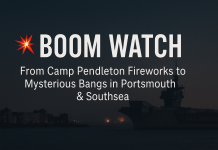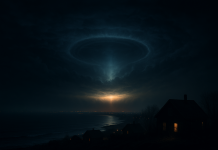Several are confirmed military training/testing; others may be skyquakes or atmospheric carry. Tips and reporting links below.

Across the U.S., communities are reporting loud booms, rumblings, and unexplained explosions. From South Carolina to Ohio, night-time detonations are shaking windows and sparking social media debates. Here’s what’s known.
💣 Bomb Squad Training Brings “Booms” in Aiken County (SC)
The Aiken County Sheriff’s Office confirmed controlled detonations as part of bomb-squad training this week — warning residents to expect loud sounds but no danger. Read WRDW advisory
Ever heard about North Carolina’s Seneca Guns?
🏙️ Loud Booms Shake North Royalton (OH)
Residents reported multiple nighttime booms “like a bomb going off.” Police ruled out fireworks and gunfire; the source remains undetermined. See FOX8 report
🎖️ Camp Pendleton (CA) Noise Advisory
Marine Corps Base Camp Pendleton announced live-fire exercises with high-explosive munitions. The base advised residents across San Diego and Orange County that booms may be heard or felt miles away. Official Camp Pendleton noise reports
🛟 NSWCDD Dahlgren (VA/MD): “Very Loud” Range Testing
NSWC Dahlgren Division issued range schedules warning of potential very loud noise from testing operations, including Potomac River danger-zone restrictions. Official NSWCDD range schedule
🌍 What’s Causing the Booms?
- Military or law-enforcement training: detonations and range exercises echo far.
- Atmospheric phenomena: inversions and “skyquakes” carry sound long distances.
- Sonic booms: jets and spacecraft tests create pressure shockwaves.
- Geophysical events: small quakes or landslides can mimic explosions.
🧭 What to Do If You Hear One
- 📅 Note time & location — collective data helps pinpoint causes.
- 🔊 Check advisories — bases post real-time training alerts.
- 📹 Record evidence — video/audio assists verification.
- 🪟 Inspect for damage — pressure waves can crack windows.
- Stay open-minded — not every boom is explained.
📚 Related Reads
💬 Strange Sounds Take
When multiple U.S. regions report mystery booms in one week, we listen. Whether atmospheric acoustics, drills, or something stranger, these remind us how little we control — or even understand — the sounds of Earth.
📰 Subscribe to the Strange Sounds Newsletter.
👉 Follow & share: Facebook · Twitter / X
Heard a boom? Comment below or contact us.
FAQs — Loud Booms, Skyquakes & Military Advisories
What are the most common causes of loud booms reported at night?
Most reports trace back to military or law-enforcement training, industrial activity, sonic booms, atmospheric ducting, or small seismic events. A subset remains unexplained and is often labeled “skyquakes.”
How can I tell if a boom was military training or something else?
Check local base or sheriff noise advisories and media alerts. Training booms often occur in clusters; if no advisory exists, consider industrial works, sonic booms, or atmospheric effects.
Can a sonic boom break windows?
Yes, though rare. Strong shock waves can crack fragile glass. Most sonic booms cause startling noise and light rattling, not damage.
What should I do if a boom shakes my house?
Ensure safety, note time & location, check advisories. Report damage or gas smell to authorities; otherwise log your observation for local tracking.
What is atmospheric ducting and why does it matter?
Temperature inversions and wind layers can channel sound, letting distant explosions be heard dozens of miles away.
How can I record useful evidence?
Use your phone to capture 30–60 seconds of audio/video after the boom, with time & GPS. Multiple recordings help triangulate the source.
Are these events dangerous?
Training booms are usually controlled and low-risk. Treat any unknown blast cautiously; if you suspect danger, call emergency services.













These are just the future sounds of children being bombed in Venezuela to keep them from selling oil in other currencies except the Jewish controlled dollar.
There use to be loud booms where I live and has since stopped for many years. So maybe you are right.